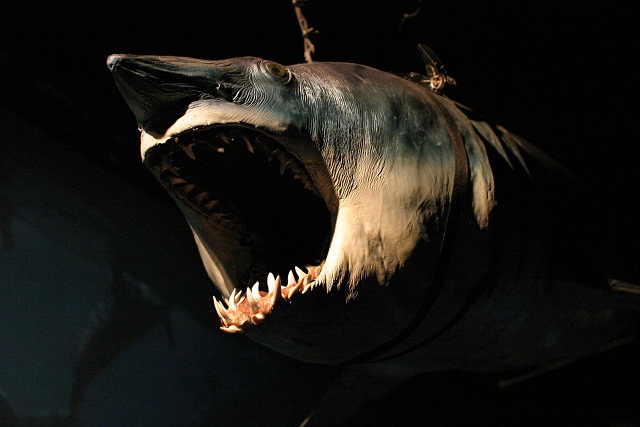Do
you know that the mako shark is
the fastest species of shark today as it is able to swim up to 65 mph (over
100 kph)? Well, knowing there is a shark that can reach a speed limit for most
of modern cars is very impressive! But knowing
that sharks have been surviving for more than 450 million years on this Earth is
ultra-impressive! So, how do sharks survive for millions of years until today?
Certainly
not all early sharks that once were roaming our seas and oceans still exist now. Judging from early fossils there are reports indicating that at least half of those species of sharks have become extinct. And nowadays, there are only a few hundreds of
sharks species remaining.
Many
of the prehistoric
sharks were quite small. Some of them looked more like fish and some were
similar to eels. Their noses were mostly round
rather than pointed. Also they did not have
a brain as large as it is today—yet, more than
2/3 of the size of a brain today is for the senses,
and it supports
their ability to smell. This is one
of the areas where sharks have considerably been
able to evolve and to become a more intelligent species.
The teeth
of prehistoric
sharks were also quite different from they are today. Instead of being razor sharp they were
smooth. This could indicate that early sharks fed upon plants in the water
instead of being meat eaters as we know them today. This could be an indication
that something occurred that made it impossible for plants
to grow for a while. In order to
survive, these early
sharks started
to consume other living creatures in the water. And today, they all eat meat.
Below are modern
sharks categories based on their diets:
- Fast-moving hunters: Many sharks (such as the great white, blue shark, mako, tiger shark and hammerhead) are swift, sleek predators that consume fish, squid, other sharks and marine mammals (such as sea lions, seals, and smaller whales).
- Slow-moving hunters: Some bottom-dwelling sharks (such as zebra horn shark, angel shark and wobbegong) are slow-swimming predators that crush and eat shellfish (such as crabs and clams) from the ocean bed.
- Filter Feeders: Some large sharks (such as whale shark, basking shark and megamouth shark) are filter feeders. They sieve tiny plankton and small animals from the water through their gills as they swim with wide-open mouths.
The
fact that sharks are found in water all over the world also shows their ability to evolve. Some species
were able to adapt to fresh water and to salt water environments. They were
also able to live in different temperatures. No wonder if many sharks species had managed
to survive five mass extinctions.
There is evidence of catastrophic events that dramatically altered the environment, resulting in the mass extinction of a significant percentage of species about 251 million years ago. During these deadly events, about 95% of living species were killed by either a comet impact or volcanic activities. Fossil evidence indicates that sharks might have survived these catastrophes by seeking refuge in the depths of the ocean or by simply diving and living deeper.
There is evidence of catastrophic events that dramatically altered the environment, resulting in the mass extinction of a significant percentage of species about 251 million years ago. During these deadly events, about 95% of living species were killed by either a comet impact or volcanic activities. Fossil evidence indicates that sharks might have survived these catastrophes by seeking refuge in the depths of the ocean or by simply diving and living deeper.
Actually, for any species that survived, mass
extinctions can provide a great opportunity to
flourish if existing predators disappeared or new habitats opened up.
These events, in turn, have sometimes given rise to “adaptive
radiations”—a
dramatic increase in new different species. Sharks also benefited from such adaptive
radiations, giving rise to many new species of sharks about 360 to 286 million years ago.
At the end of the Cretaceous about 65 million years ago,
another global catastrophe destroyed a mass number of species, including the
dinosaurs. The sharks who survived that mass extinction
include the modern sharks of today.
But, are sharks going to be able to survive? There is fear
that sixth mass extinction
will happen due to human
taking too much control today, resulting in great challenges for sharks to continue to evolve for survive. Similar conditions also happen to many other species which are in danger of becoming extinct. Only time will tell if sharks are able to survive today despite the fact that they have certainly done an amazing job of it millions of years ago.
***
Photo: Freeimages.com/Piotr Ciuchta
Bagikan
How Sharks Survive for Millions of Years
4/
5
Oleh
Unknown





